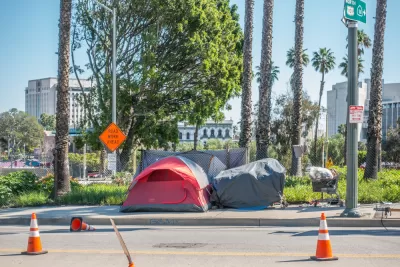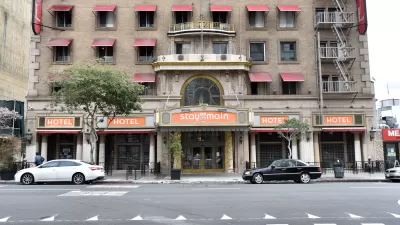Along with communal showers and bathrooms, the village will also include laundry, storage facilities, and offices for social service providers.

A community of tiny shelters aimed at helping unhoused people transition to more permanent housing is being built in a vacant lot in Los Angeles' Echo Park neighborhood, where the neighborhood's eponymous park recently became a flashpoint of the heated debate over the city's perennial and growing homelessness crisis.
"The village's 38 cabin-like structures will contain a total of 74 beds, according to Alexis Florio, speaking for Lehrer Architects. The prefabricated units are made off-site by a company called Pallet" and can be assembled in under an hour, writes Barry Lank for The Eastsider LA. "In addition, contractors are assembling a hygiene trailer with toilets and five showers. The village also include[s] a guard booth, a storage unit, and a large administration office unit with a laundry facility and room for social service officials." The structures cost around $9,000 each including installation, with a total project cost of $3 million—well below the close to $5.7 million budget approved for the project. Operations costs for the site are expected to be $1,485,550 for Fiscal Year 2021-2022.
Earlier this spring, Echo Park Lake, located less than a mile to the south of the tiny home village, was the site of a tense standoff between unhoused residents and their advocates and police as the city cleared the massive encampment that had developed in the park during the pandemic. While the city has placed many of the former park residents in hotel rooms via Project Roomkey, advocates say the forceful removal was unnecessary and the services provided are inadequate, especially during a pandemic.
FULL STORY: A "village" of 64-square-foot homeless shelters is taking shape in an Echo Park parking lot

Alabama: Trump Terminates Settlements for Black Communities Harmed By Raw Sewage
Trump deemed the landmark civil rights agreement “illegal DEI and environmental justice policy.”

Planetizen Federal Action Tracker
A weekly monitor of how Trump’s orders and actions are impacting planners and planning in America.

Why Should We Subsidize Public Transportation?
Many public transit agencies face financial stress due to rising costs, declining fare revenue, and declining subsidies. Transit advocates must provide a strong business case for increasing public transit funding.

Understanding Road Diets
An explainer from Momentum highlights the advantages of reducing vehicle lanes in favor of more bike, transit, and pedestrian infrastructure.

New California Law Regulates Warehouse Pollution
A new law tightens building and emissions regulations for large distribution warehouses to mitigate air pollution and traffic in surrounding communities.

Phoenix Announces Opening Date for Light Rail Extension
The South Central extension will connect South Phoenix to downtown and other major hubs starting on June 7.
Urban Design for Planners 1: Software Tools
This six-course series explores essential urban design concepts using open source software and equips planners with the tools they need to participate fully in the urban design process.
Planning for Universal Design
Learn the tools for implementing Universal Design in planning regulations.
Caltrans
Smith Gee Studio
Institute for Housing and Urban Development Studies (IHS)
City of Grandview
Harvard GSD Executive Education
Toledo-Lucas County Plan Commissions
Salt Lake City
NYU Wagner Graduate School of Public Service





























